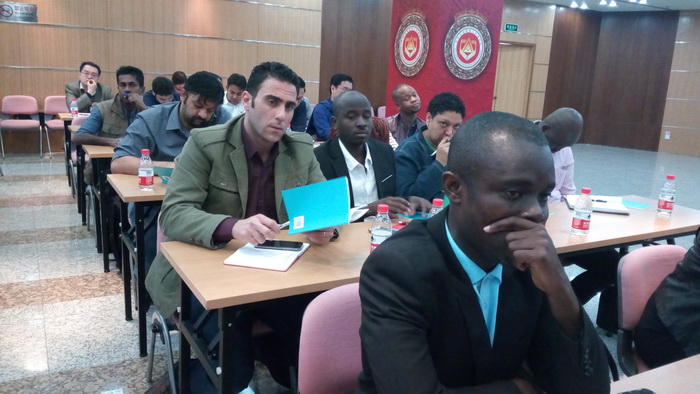
Get China news from China – Journalists Association
African media have been urged to source stories on China from Chinese media outlets to get the true picture on issues in the country.
Advertisement
The call was made by the Executive Secretary of the All-China Journalists Association (ACJA), Ms. Wang Dongmei during an encounter with African and Asian journalists in China on a development studies and media exchange programme under the auspices of the China Africa Press Centre (CAPC) and the China South Asia and South East Asia Press Centre (CSASEAPC).
Ms. Wang indicated that there had been inaccurate reportage by African media on China over the years resulting in a different view of China because they had taken their stories from other sources other than Chinese media outlets.
“Chinese also have a different picture about Africa because they source news from Western media. That is why they have set up in Africa and Asia asking for comprehensive stories from Africa and Asia on issues,” she said.
Ms. Wang cited China’s Xinhua News Agency, China Radio International (CRI) which broadcasts in Hausa and the China Global Television Network (CGTN), as Chinese media that had set up offices in Africa and Asia in order to get first hand information on happenings in those regions.
She recommended that African media should also do same or get their information from the right sources to present the true picture of China to the world.
Media environment
And contrary to views expressed by the African journalists that China’s media environment was stifled because all media were state-owned and controlled, the ACJA Executive Secretary stated; “the environment is becoming more and more transparent for Chinese and foreign journalists to work in.”
She said “Before the 2008 Olympics, if a foreign journalist had to do a report in China he had to apply for a permit from the local government as well as apply to a company or organisation of the local government but now all these kinds of restraints have been loosened and now if a foreign journalist wants to do an interview in China, if the interviewee accepts the requirements you can do the interviews.”
On whether the media could hold the government accountable in the performance of its duties, Ms. Wang said the two largest media – the People’s Daily and China Central Television (CCTV) had the oversight of government policies at the national level and quizzed officials on issues relating to policies that the people had challenges with.
She said at the provincial and municipal levels the local media also played that role by interviewing government officials on issues which were telecast live on television and follow ups done if answers provided to queries were not satisfactory, until those issues had been solved.

Some of the African and Asian journalists at the meeting. PICTURE BY EDMUND SMITH-ASANTE
Relations with journalists associations
Touching on the nature of relations with other journalists associations, Ms. Wang said they were based on openness, cooperation and mutual benefits, adding that the ACJA organised training and accepted visits by African and Asian journalists especially but enjoyed a very good rapport with other foreign journalist associations.
Revoking of license
An issue that engaged the interest of the visiting CAPC journalists was the revocation of licenses of practicing journalists when they went outside the tenets of the profession and the withholding of the same if they failed in examinations.
Explaining the issues that may result in withholdings and revocations, Ms. Wang said the journalists have to write examinations, go through interviews and be part of case study groups to get jobs as media persons.
“Each year over 10,000 candidates apply for the major media at central level but less than one per cent get the job. When they finally get the job they have to pass their annual examinations and assessments; if they are not in line with the standards proposed they will lose their jobs.”
She said the journalists who did reports were required by law to sit examinations to get certificates issued by the state administration for press publications, reviews, television and film.
“And we can revoke their certificates if the journalists violate professional ethics or the relative laws and regulations,” she stated, adding that the ACJA strictly followed a law framework to safeguard the rights and interests of local and foreign journalists and also their management.
“All journalists have to follow their professional ethics in fulfilling their social responsibilities and follow the press laws and regulations so that they can have the freedom in reporting and interviewing,” Ms. Wang said.
Awards and compensation
But it is not all doom for the journalists in China. Ms. Wang said there were two key awards programmes – one held annually and the other bi-annually, to reward deserving hardworking journalists.
After a very stringent review of works submitted by a 70-member committee, the general public is also offered the opportunity to assess the works of the journalists put up for the awards which are put on the internet for a month.
“We redo the process if there are any complaints,” before the final ceremony which is held on November 8 of each year to mark the Journalists Day in China began in 2000, Ms. Wang said.
The bi-annual awards is for the best 10 editors and 10 best journalists based on the recommendations of people but it also goes through very stringent scrutiny before the finalists are selected and awarded.
Ms. Wang said journalists who suffered any injuries in the line of duty also received some compensation from the ACJA apart from what is paid by their media houses, depending on the extent of their injuries and was at the discretion of the association.
She said the amount ranged from RMB 10,000 to RMB 100,000 averagely but cited a one-time payment of RMB 300,000 to a journalist who suffered some war injuries in Africa.
Writer’s email: [email protected]



